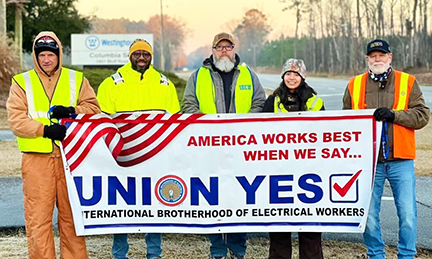By Jessica Holdman
COLUMBIA — Some 600 workers at a Columbia-area nuclear fuel plant are expected to vote on whether to unionize after filing a petition with the National Labor Relations Board last week.
A group of employees working for the nuclear arm of Westinghouse Electric Company, which employs more than 900 people in a facility near Congaree National Park, has petitioned to join the International Brotherhood of Electric Workers (IBEW) union.
IBEW has 820,000 active members and retirees working in the utilities, construction, telecommunications, broadcasting, manufacturing and railroad industry. The union has about 600 chapters, known as locals, operating in all 50 states, according to the union’s directory.
The union directory shows six locals operating in South Carolina — three headquartered inside the state and three that come across the North Carolina and Georgia borders. Those members work in the telephone, radio and television industries, trim trees near power lines and serve in operations and maintenance capacities.
The process
Federal labor laws require 30% of eligible employees to sign on to a petition in order to initiate a vote. Westinghouse and the unionizing employees still have to agree on a date, ballot language and other details of the vote.
A union is certified if it wins more than half of the votes cast. An employer may also voluntarily recognize a union without it going to vote.
Either way, union members and the company would then have to enter negotiations on the union’s demands, which can include pay, hours, benefits working conditions and more. It is an unfair labor practice under federal law if a company fails to bargain with the union.
An IBEW organizer declined to tell the S.C. Daily Gazette what the union hopes to achieve if it wins the Westinghouse vote and begins bargaining for members. Westinghouse also did not immediately respond to an email from the news outlet.
Nation’s lowest union participation
IBEW filed the Westinghouse petition two days after Gov. Henry McMaster bashed unions in his State of the State address last week.
“One thing we do not need is more labor unions in South Carolina,” the governor said.
“We will not allow the Biden administration’s pro-union policies to chip away at South Carolina’s sovereign interests,” he continued. “We will fight all the way to the gates of hell. And we will win this battle.”
His speech was referring to a legal battle with the International Longshoremen’s Association.
In 2021, that union sued maritime shipping carriers that called on the Port of Charleston. Non-union state employees traditionally have run the port’s massive cranes, while Longshoremen are limited to moving cargo through the terminal yards.
But the union is seeking the right to operate those cranes at the port’s Hugh K. Leatherman Terminal, which opened in 2021 and is named for the late state Senate Finance chairman who secured the terminal’s funding.
The case has made its way to the U.S. Supreme Court.
On Thursday, Feb. 1, McMaster’s spokesman made clear the GOP governor opposes all unionization efforts.
“The governor will continue to stand against big labor and ensure that unions don’t destroy our state,” said Brandon Charochak, calling unions “a clear danger to our prosperity.”
South Carolina is a “right-to-work state,” which means even workers covered by a union contract can’t be required to join and pay dues to the union.
The state has the lowest percentage of union membership in the nation, at 2.3% as of 2023, according to U.S. Department of Labor statistics.
State Rep. Wendell Gilliard, a former union organizer, called McMaster’s speech insulting both personally and to all hard-working union members. As he left the chamber, the Charleston Democrat told the SC Daily Gazette that he hopes McMaster’s words boomerang and galvanize union organization in the state.
Gilliard may get his wish.
With operations in all 50 states, South Carolina is not the first right-to-work state where IBEW has organized.
Westinghouse opened its Richland County plant in 1969. It is one of only three nuclear fuel factories of its kind across the country and supplies nuclear fuel for about 10% of the electricity generated in the U.S.
The company also operates two other fuel plants abroad. The first opened in 1946 in the United Kingdom and serves 11 countries. The other is in Sweden.
Westinghouse made $131 million in equipment upgrades to the facility, further automating the plant, in 2021. Those investments also included pollution prevention measures at the facility following a decades-long history of uranium spills and leaks, according to reports by The State newspaper.
Jessica Holdman writes about the economy, workforce and higher education. Before joining the SC Daily Gazette, she was a business reporter for The Post and Courier.





